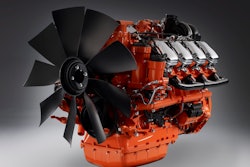The World Energy Outlook (WEO) finds that diesel fuel will remain the “dominant” growth fuel between now and 2035, according to the International Energy Agency (IEA), the author of the November 2012 report.
“The IEA report findings reinforce the importance of diesel as a fuel and technology well into the future and further highlight the potential for continued gains in diesel energy efficiency around the globe,” says Allen Schaeffer, the Executive Director of the Diesel Technology Forum.
The IEA’s findings are consistent with those of the National Petroleum Council in its recent report “Advancing Technology for America’s Transportation Future” for the U.S. Department of Energy. The NPC report states “Diesel engines will remain the powertrain of choice for HD vehicles for decades to come because of their power and efficiency. There are, however, opportunities to improve the technology. Significant fuel economy improvements in diesel powered trucks are possible. Indeed, the fuel economy (mpg) for new Class 7&8 HD vehicles, which consume more than 70% of the fuel in the trucking fleet, could be doubled.”
According to the new IEA report, more than 60% of all diesel consumed globally in road transport is consumed by trucks and diesel accounts for more than 90% of the total fuel use by trucks.
“There is a reason the International Energy Agency, the National Petroleum Council and virtually all U.S. and international energy and transportation analysts predict diesel will remain the dominant energy source for decades to come,” Schaeffer says. “The reason diesel powers the overwhelming majority of the nation’s commercial trucking, school and transit bus fleets is because of diesel’s unmatched combination of availability, safety, energy-efficiency and economical operation and performance compared to all other energy sources.
“In addition, the significant environmental performance and prospects for even greater energy efficiency will continue to make diesel the technology of choice for the future. The advances in diesel technology have improved fuel efficiency and significantly reduced emissions to the point that diesel engines are now near zero emissions.”
International Energy Agency: Diesel to Continue To Dominate Heavy-Duty Truck Market
Even with assumed growth in natural gas and biofuel substitutes, diesel fuel continues to be the dominant fuel for well into the future, according to the IEA report. Globally, the report suggests the possibility of only a 2% share of natural gas in the heavy-duty transport market by 2035. It also notes that some markets such as the U.S. heavy-duty truck market could see up to 10% penetration of natural gas by 2035.
“Often times the conversation on energy is dominated by technologies that might play a role in the future, when we should be paying more attention to those technologies like diesel that are actually moving our economic and transportation systems today,” Schaeffer says. “In addition, we need to focus on how each energy source will transform and how further improvements will play a major role to help us achieve greater energy efficiency in the future.”
The report notes that on a global scale, alternative fuels including natural gas and biofuels are expected to grow from 2% share today to 5% by 2035, with diesel’s share of total road freight energy consumption being 90%.
Diesel Fuel Economy Gains Expected
The report notes the “technical potential” for fuel-economy gains in heavy-duty diesel trucks in the United States and Europe by as much as 50% by 2020. Others in industry suggest that the gains may be less (30%) and take longer (2030) than the IEA forecasts.


















